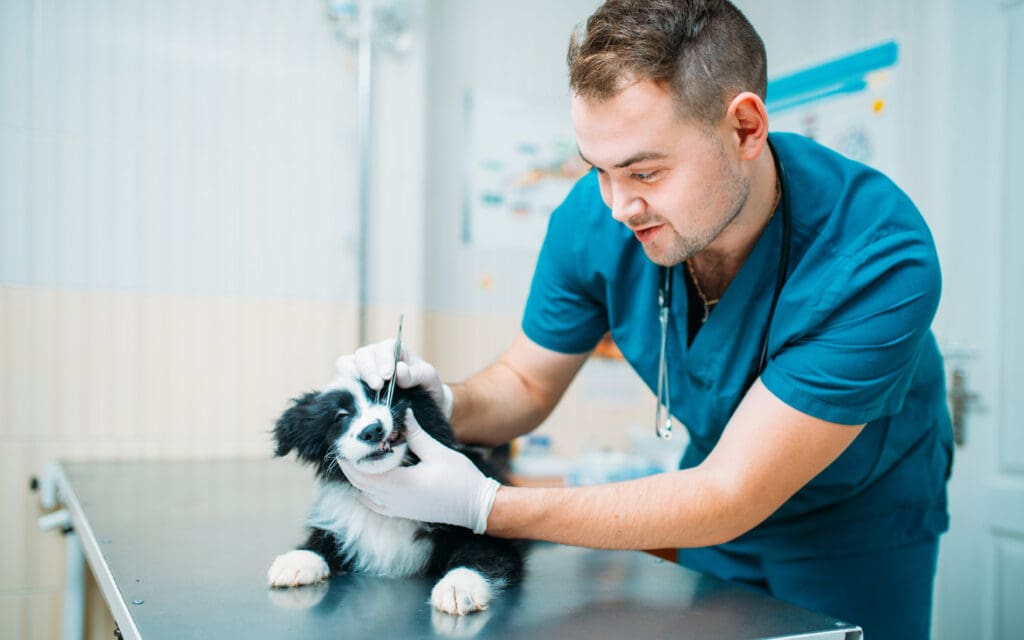From bad breath to tooth discoloration to chewing problems, these signs and more indicate that your dog may have an oral health issue. Poor oral health can lead to bigger health problems. Here are 10 reason’s to pay more attention to your pooch’s teeth.
10. Bad Breath Indicates Oral Health Issues

If your dog has bad breath, it’s not a reflection that the last thing they ate stinks. It actually indicates that your dog’s teeth require attention. Bad breath signals your dog’s teeth could use more regular brushing, and may need professional cleaning. It could also be a sign of a more serious oral health issue.
9. Dogs’ Teeth Need Regular Brushing

All dogs should have their teeth brushed regularly. Ideally, a dog’s teeth should be brushed once daily, or at least a few times a week. For best results, use a toothbrush and toothpaste designed for dogs. Regular brushing can help prevent plaque buildup that can lead to tartar and periodontal disease in dogs.
8. Pet Dental Products Can Help

In addition to brushing your dog’s teeth, give your dog a “dental treat” designed to help clean a dog’s teeth. Doggy dental treats can help fight the bacteria that leads to the buildup of plaque and tartar on your dog’s teeth. Look for products that take longer to chew, as they will provide more “cleaning time” for the dog’s teeth.
7. Pay Attention to the Color of Your Dog’s Teeth

If your dog has discolored teeth, it signals tartar could be taking over their mouth, and they may even have some dead teeth. A veterinarian can help determine if a yellow or brown tooth is a surface problem, such as staining, or a more serious issue. An issue with the root will cause a pink, purple, gray, blue, or black tooth.
6. Watch for Bleeding Gums

In humans, bleeding gums are a sign of gingivitis, and it’s also true for dogs. If your dog’s gums look inflamed or are bleeding, take them to a veterinarian immediately. Untreated bleeding gums develop into periodontitis which leads to tooth loss, bone loss, as well as heart disease.
5. Note Any Chewing Problems

Certain signs indicate your dog is having a problem chewing, which typically signals tooth pain or a tooth problem. One sign is a dog no longer wanting to play with chew toys. Another sign is your dog spitting out or ignoring food it previously enjoyed. This is more common in senior dogs. If you see the signs, visit your vet.
4. Note Where Tartar and Plaque Are in Your Dog’s Mouth

Black tartar above a dog’s gumline won’t necessarily threaten its oral health. Especially, if addressed quickly before it advances to periodontal disease. However, tartar below the gum line can lead to tooth infection. This causes pain and eventually will result in tooth loss. Additionally, periodontal disease in dogs can lead to heart, liver, and kidney problems.
3. Pay Attention to Your Dog’s Appetite

If your dog normally has a healthy appetite but begins struggling to get its food down, it could be a sign of a dental problem. Your dog may have an infected or abscessed tooth. If the problem worsens or goes untreated, it can lead to tooth loss. Worse, untreated infected, or abscessed teeth can lead to potentially fatal respiratory infections.
Read More: Strange Dog Behaviors and Warning Signs to Watch For
2. Dog Dental Disease Can Worsen Diabetes

A dog that suffers from oral health issues, such as gingivitis, bleeding gums, or any other periodontal disease, can develop inflammation that impacts their blood sugar metabolism. This becomes crucial for dogs that already have diabetes. Maintaining a diabetic dog’s oral health is important for keeping diabetes under control.
Read More: Why Do Dogs Chatter Their Teeth?
1. Professional Dental Cleanings Are Important

It is recommended that you take your dog to a veterinarian or veterinary dentist at least once per year for an oral examination. Ideally, (performed under anesthesia), your dog should receive a full tooth exam and x-rays. This allows the veterinarian or veterinary dentist to fully assess what is going on with your dog’s oral health.
Read More: All-Natural Dog Treats — The Proof is in the Chew






